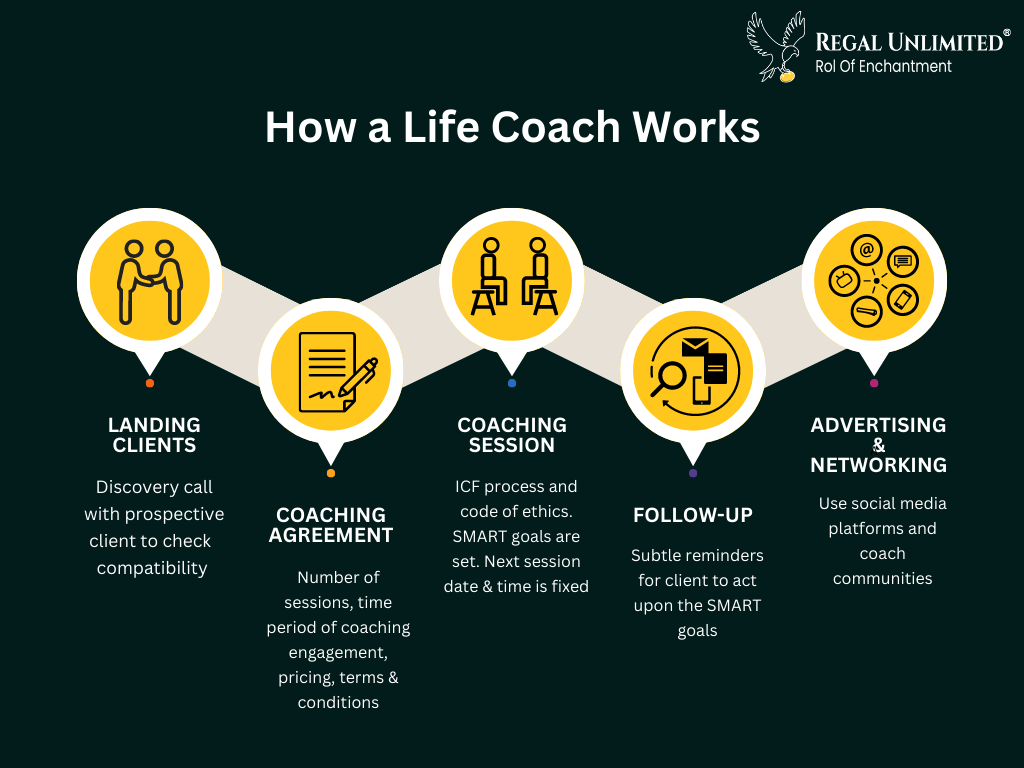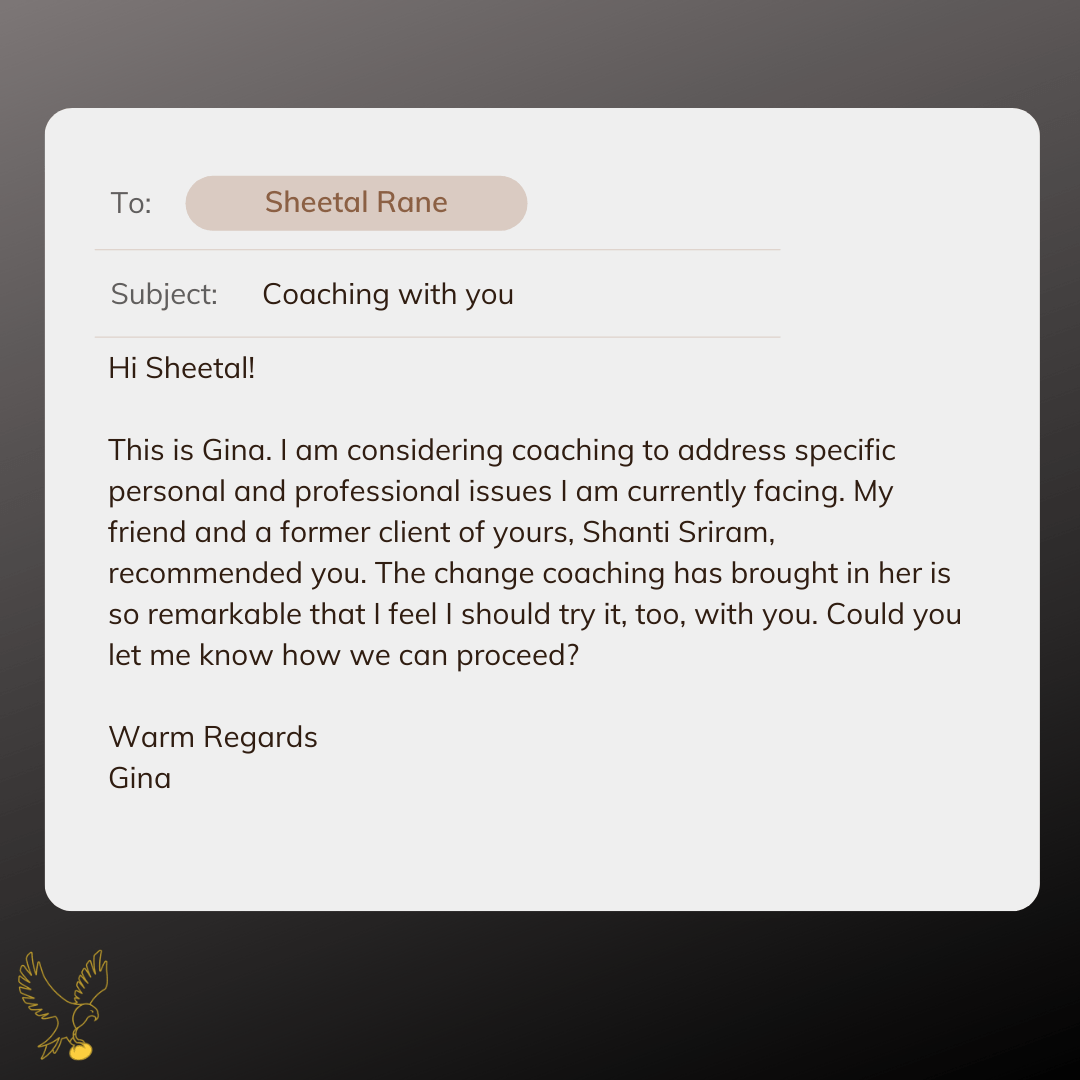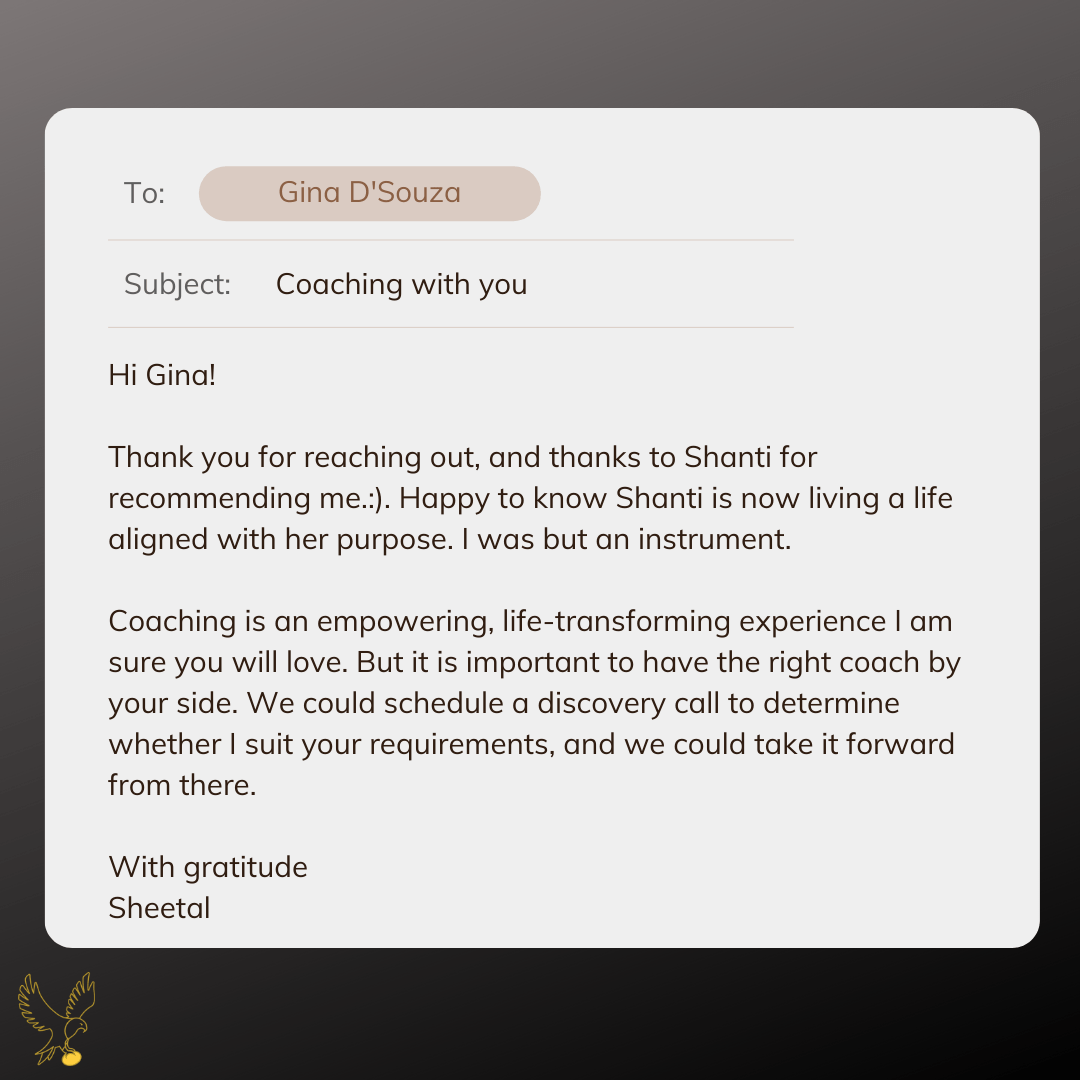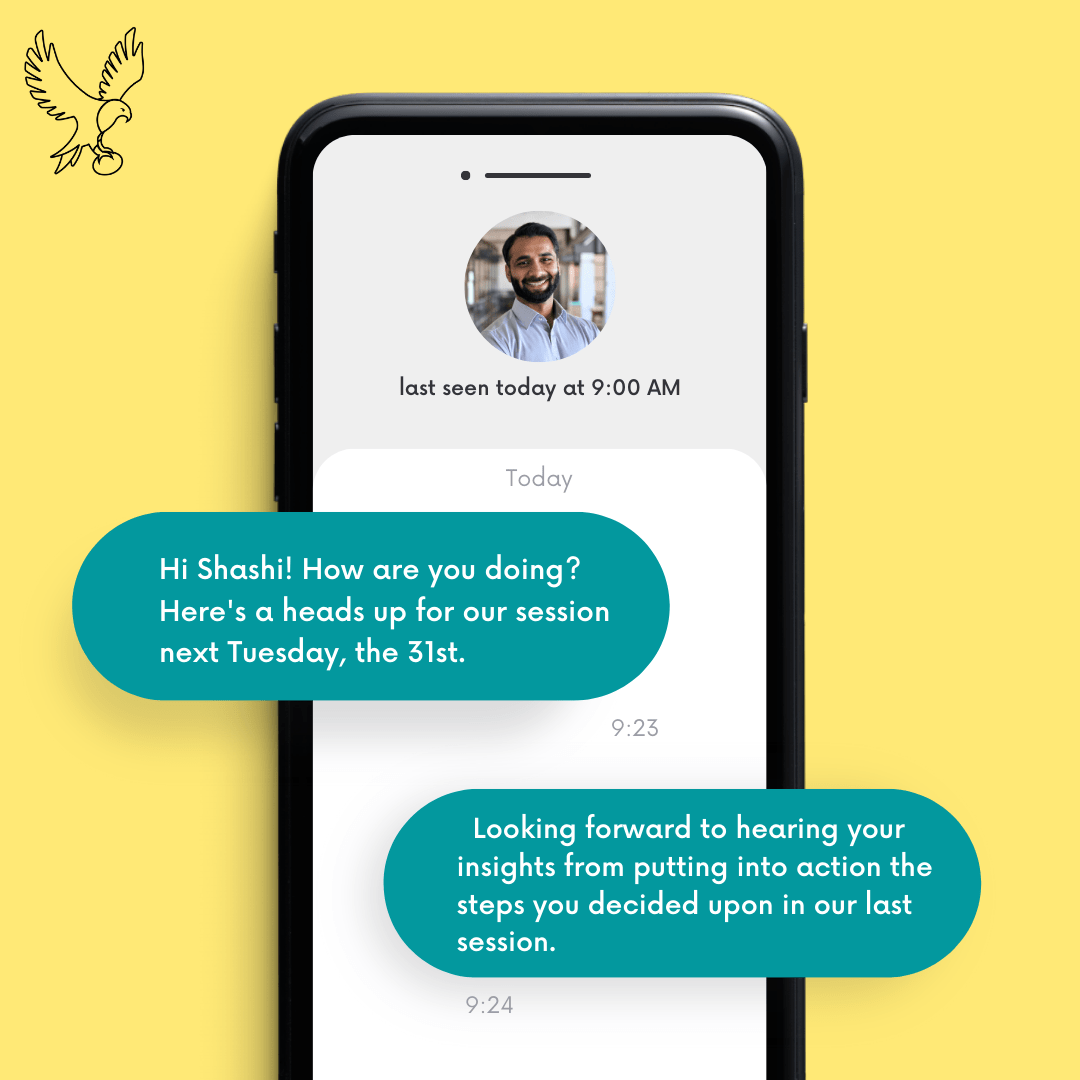What is it like to be a life coach?
My friend, Ravina, asked me. I knew it was more than mere curiosity. She was searching for a second meaningful career after retiring from the armed forces. Something that would be fulfilling and rewarding. Something that would give financial independence and time flexibility.
A blog about the life of a life coach would help not just her. It would help all of you who are contemplating taking up a life coaching career or just starting off in one and want to know ‘what it is to be a life coach.’ Out here, I will cover how life coaches land coaching engagements, follow up with clients, network, handle paperwork, etc. So here goes!
I interviewed two highly successful life coaches. Abirambika Ravivarman(ICF-PCC) is a Life & Leadership Coach based in Canada. Anupreet Vig (ICF-ACC) is a Mindset Transformation & Life Coach from Delhi. This blog is a compilation of their inputs as well as research into the lives of life coaches.
A typical day for a life coach

Let’s see how a typical day of a life coach goes through the fictional story of life coach Sheetal Rane, a solopreneur running a successful life coaching business.
Landing a coaching engagement


Coaching is majorly a referral business. So most clients are those referred by former clients. Your good work gets carried by word-of-mouth as it did for Sheetal.
Many life coaches also have their own websites, and prospective clients contact them there. Some, like Abirambika, have official & personal websites. Individual clients connect to her through her personal website. Organizations get in touch with her through her official company website.
The discovery call for life coaching
Sheetal checks her watch. It is time for the 30-minute discovery call with Imtiaz, a prospective client who contacted her through her company website. He is a young leader who wishes to use life coaching to clear his head about life & career goals and see whether they align with his vision for his future.
A discovery call is set up to accomplish the following –
● The life coach can understand the prospective client’s goals and objectives
● The life coach can assess whether they can help the client
● The client can assess if the coach is right for him/her (assess chemistry)
● The life coach can explain the process, steps, and ethics of life coaching
A discovery call, also called a chemistry call, is generally a 30-45 minute session conducted to know the fitment of the coach & the prospective client.
A Life Coaching Agreement
Sheetal’s discovery call with Imtiaz is fruitful. He is keen on working with Sheetal. She, too, feels it would be a mutually fulfilling coaching relationship. They decide on a date for the first life coaching session. Sheetal notes it in her scheduling calendar. She then draws up a life coaching agreement and mails it to Imtiaz.
A coaching agreement or contract outlines the terms and conditions of the life coaching engagement. It gives the number of coaching sessions and the period of the life coaching engagement.
A life coaching engagement is typical of 6 to 8 sessions, with about 2 sessions per month.
Anupreet says that along with the coaching agreement, she shares extra reading material about coaching, its benefits, and how it works. Abirambika has authored a book on the same. This helps the client understand what they can expect from the life coach, the life coaching process, and what is required of them as coaches.
Life Coaching Session
After sending Imtiaz the life coaching agreement, Sheetal gets into a coaching session with another client, Ranu. She completes the session by setting the time and date for the next session. Sheetal jots the details into her scheduler. She then notes down Ranu’s action steps in her journal. Finally, she marks a date to send a follow-up message and reminder.
Life coaching sessions usually last 45 minutes to an hour. In one session, the life coach & client discover focus areas, uncover limiting beliefs, and set actionable steps. A coaching session is only the trigger. All the ‘action’ and resulting changes happen in the time between sessions. The next life coaching session becomes ineffectual if the client does not do the homework. That is where follow-up becomes important.
Follow up by the life coach
Coaching done, Sheetal looks at her schedule for the day. It is time to send Shashi, a client, a reminder for their next life coaching session.
Life coaching is impactful when the client acts upon action goals set in the coaching session. Since coaching is an adult-adult relationship, the client is expected to follow through without handholding or nudging. But most life coaches subtly check up on progress, as Sheetal did.

Abirambika shares that she asks for a general status update a week before her next session. “Otherwise, clients easily get lost in the busy schedule of their lives and forget to act upon what they decided. This way, they come with some progress in the coming session and can move on from there,” she says.
How do life coaches keep their schedule with multiple life coaching engagements happening simultaneously? Abirambika uses Trello to set schedules of sessions, send reminders, etc. Anupreet is more old school and maintains a journal for the same.
Paperwork
Abirambika and Anupreet both share that the coaching agreement is the only major paperwork. The rest is maintaining pointers from client sessions, setting reminders, and sending follow-up messages.
Advertising & Networking
Sheetal checks her schedule. She has kept aside one hour to sharpen her personal brand. She writes a LinkedIn post and finalizes a life coaching blog for her website.
Many coaches ignore marketing themselves; they are too busy selling ‘coaching’. But people seek the ‘Coaches’ and not the mere product – Coaching.
If life coaching is your bread and butter, you must spend quality time and resources to advertise yourself. Coaches use different strategies such as videos, podcasts, blogs, and posts. Most life coaches, like Sheetal, promote themselves on online platforms LinkedIn, Twitter, and Facebook.
Anupreet gives podcasts on Spotify and Mentza. She also writes blogs. Abirambika is an active blogger, podcaster, and Instagram user. . Abirambika also has support staff who creates the posts she conceptualizes. She also regularly posts videos about coaching.
You can check out Abirambika’s Insta profile here.
Networking
How do life coaches network? LinkedIn is the most popular online networking platform for connecting with prospective clients.
Life coaches also become part of supportive coaching communities, like Regal Unlimited’s community of alumni & alumnae coaches as many life coaching engagements come through referrals from other coaches.
Regal Unlimited conducts regular coach meet-ups to enable like-minded coaches to connect and network.
Many life coaches also join networking groups, which may involve a membership fee or attendance fee for meet-ups.
Practising Self-care
Sheetal has a well-defined wellness regime. Jogging and gymming are her stress-busters. Meditation helps her stay calm and focused. Sheetal ends her day with 20 minutes of self-reflection followed by meditation.
Impactful life coaching requires life coaches who are centered and grounded. This comes through regular self-care.
What you do is very individual. Abirambika studies and practices Buddhism. Anupreet reads books, does Zumba, and does self-talk.
Both feel peer coaching with their cohort mates is a great way to clear their heads. Anupreet also does self-coaching to come out of limiting beliefs and behaviors.
Now you know how the day goes for a life coach – a day of purpose, action, achievement, and fulfillment. There are many benefits of taking up life coaching as a career.
Do you wish to become a life coach too?
Then take the first step by enrolling in Regal Unlimited’s ICF-ACC program.
Here’s why you cannot miss being a part of our next cohort!
Regal Unlimited’s ICF certification – the most sought-after program.
● the perfect ecosystem for aspiring coaches to flourish and expand their base.
● 300+ coaches already trained.
● Best coach trainers & high-quality training
● Build your coaching muscle through the ICF-mandated 100 hours of coaching practice.
● Get mentored all through your credentialing
● Participate in our Coach Accelerator Program to quickly materialize your entrepreneurial dreams
● Get last-mile support in ICF-credential renewals
● Take part in Coaching Unlimited – coaching intensives to sharpen your coaching practice
Train to be an ICF-certified and credentialed life coach with Regal Unlimited.
Reach out to us at info@regalunlimited.com
Abirambika Ravivarman (ICF-PCC) is an accomplished Life & Leadership coach who loves facilitating people to take the inner journey to develop an optimistic mindset, resilience, and mental strength. You can find out more about Abirambika here
Anupreet Vig (ICF-ACC) is a vibrant Mindset Transformation & Life Coach whose vast experience as a clinician, management leader, and academician helps her understand & support people of varied backgrounds and age groups to achieve their life goals. View Anupreet’s LinkedIn profile here.
FAQs
What is life coaching?
The International Coaching Federation defines coaching as partnering with a client in a creative, thought-provoking process that inspires the client to maximize their personal and professional potential.
In life coaching, the life coach uses the coaching process to create self-awareness and clarity in the client that enables them to work towards and achieve professional and personal goals..
Does life coaching really work?
The ICF coaching process is scientifically based and proven to be effective. Life coaching works when both the coach and the client faithfully adhere to the coaching process. A 2017 ICF Global Consumer Awareness Study revealed that 97% of Indian coachees felt benefited from life coaching.
What are the benefits of a life coach?
- Life coaching enables individuals to be more self-aware.
- It creates authentic individuals. Life coaching gives clients the self-confidence to be their true selves.
- People who take up life coaching become more compassionate and non-judgemental.
- Life coaching helps people become process-focused rather than outcome focused.
- Life coaching helps individuals realize their impact on others around them. Thus through life coaching, people become empathetic and sensitive to others’ needs
How do I market myself as a life coach?
Strengthen your presence on social media platforms like Twitter, LinkedIn, and Facebook.
Create your own website and feature yourself and your work there. Write blogs on life coaching and publish them.
Build a brand for yourself with our Coach Accelerator Program. Get the know-how to start your own life coaching business, and strategies to market yourself and network effectively.



